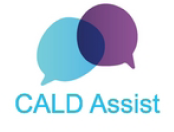AN INNOVATIVE app developed by Western Health to help allied health professionals better communicate with non-English speaking patients is now available on iTunes.
now available on iTunes.
Nine years after Western Health speech pathologist Courtney Pocock developed its first prototype – in the form of flash cards and audio tapes – the CALD Assist app is now available via iTunes to all dieticians, occupational therapists, physiotherapists, podiatrists and speech pathologists. And it is free.
The app, developed in partnership with CSIRO, uses a series of words, pictures, audio and video to facilitate communication between clinicians and patients.
The app has translations for 116 simple phrases, such as “do you need glasses?” and “may I listen to your breathing?”, in 10 languages commonly spoken in Melbourne’s west my – Arabic, Croatian, Italian, Mandarin, Spanish, Cantonese, Greek, Macedonian, Serbian and Vietnamese.
Ms Pocock, who has played a key role throughout the development of the app, presented CALD (Culturally and Linguistically Diverse) Assist at the Victorian Allied Health Research Conference in Melbourne in March.
Ms Pocock emphasised that CALD Assist was not meant to replace interpreters, but rather complement their services.
“Clinicians should definitely still contact interpreters,” she said.
“This is about facilitating communication when there’s no interpreter immediately available.”
Sally Brinkmann, manager of speech pathology and audiology at Western Health, said clinical trials of CALD Assist had shown that the app often allowed non-English speaking patients to receive an initial assessment sooner, and enhanced their communication with care providers.
Ms Pocock was a new graduate speech pathologist at Western Health in 2008 when she first identified the need for a more practical way of communicating with non-English speaking patients.
One particular patient – an elderly, Italian-speaking woman with dementia – had been identified as “nil by mouth” because she appeared to be having trouble swallowing.
As clinicians were having trouble communicating with the patient, Ms Pocock, having learnt basic Italian at school, tried a new tactic.
“I said ‘hello, how are you?’ in Italian,” Ms Pocock said.
“That was about all I could say, but her eyes lit up and it was enough to get a basic response.”
Ms Pocock quickly established that the patient could, in fact, swallow. And it sent this then junior speech pathologist on a mission.
“I went back to the office and I said to my colleague ‘imagine if we learnt some basic words in every language’.”
Years of Western Health research since have seen rudimentary flash cards evolve into audio tapes, CDs and picture books – and now, with the assistance of CSIRO, CALD Assist.
Dr Jill Freyne, team leader at CSIRO e-Health, said the CALD Assist app was an excellent example of digital solutions improving patient care: “With the tap of a screen patients can now help clinicians better understand their needs”.
To download the app onto your iPad, visit the iTunes App Store.
Western Health and CSIRO are currently developing an updated version of CALD Assist for nurses. This is due to be released in November 2017.
For more information visit the CALD Assist page.
